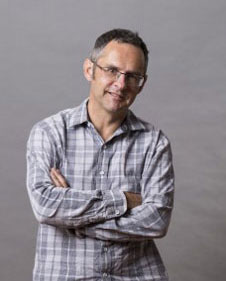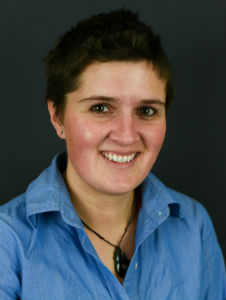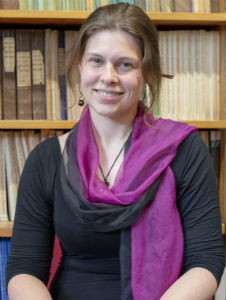 Thursday 25 October 2018 9:11am
Thursday 25 October 2018 9:11am
Professor Tony Merriman
One of the country's leading scientists in the area of gout and metabolic disease, University of Otago Professor Tony Merriman, is one of three researchers nationally to receive a prestigious James Cook Fellowship.
The Royal Society Te Apārangi announced today that Professor Merriman will receive the Fellowship to help continue his research into the genetic causes of gout and related diseases in New Zealand.
His colleagues, Dr Alana Alexander, from the Department of Anatomy and PhD student Rachael Baxter are among another ten researchers' acknowledged today by the Royal Society through fellowships and scholarships.
Recognised as highly promising researchers at the early stages of their careers, Dr Alexander has been awarded a two-year Rutherford Foundation Postdoctoral Fellowship and Ms Baxter a three-year Cambridge Rutherford Memorial PhD Scholarship.
The James Cook Research Fellowship is awarded annually to support researchers with knowledge, skills and ideas and to recognise “research professionals of excellence”. Professor Merriman says he is very pleased to receive the James Cook Fellowship and recognition for his research programme.
“It is wonderful to receive the Fellowship and be able to concentrate on the genetics of metabolic disease (gout, diabetes, kidney and heart disease) in Māori and Pacific people.”
In a very practical sense, Professor Merriman says it will also give him some respite from having to find precious research funding for his salary and enable him to concentrate on his research over the next two years.
Gout is a painful and debilitating arthritic disease caused by persistently elevated levels of urate in the blood, which causes severe joint pain and swelling, especially in peoples' toes, knees, elbows, wrists and fingers. If left untreated, it can cause serious damage to joints, kidneys and quality of life.
The genetic control of urate (hyperuricemia) is becoming better understood however, less is known about why only some people with raised levels of urate develop gout, while others do not. To address this, Professor Merriman is leading an international consortium to scan the human genome for genes controlling the progression from hyperuricemia to gout.

Dr Alana Alexander
Rutherford Foundation Postdoctoral Fellowship: Dr Alexander has been awarded the Rutherford Foundation Postdoctoral Fellowship to investigate for the first time whether hologenomic approaches can answer key questions in conservation biology.
Hologenomics takes a holistic approach to genome sequencing where the DNA of the host animal as well as its co-existing microbes is sequenced.
“The project hinges on the idea that the bugs that we carry on our skin, in our lungs and all through our bodies are just as much a part of our general make-up as our own cells. Together we form a super organism, or a holobiome,” Dr Alexander explains.
“I'm interested in whether patterns of genetic diversity across the holobiome, also known as the hologenome, can be used in conservation biology.”
The test case she proposes to use are the Māui and Hector's dolphins. There remains significant uncertainty about crossbreeding between these two subspecies, the degree of population fluctuation, inbreeding and disease susceptibility and the ongoing impact of human activities such as fishing. Hologenomics could be an important tool to understand the mechanisms behind these issues.
Dr Alexander receives a $75,000 stipend annually for two years, plus $10,000 annually for direct and indirect research costs.

Rachael Baxter
Cambridge Rutherford Memorial PhD Scholarship: Ms Baxter is one of three people nationally to receive these scholarships with her research aimed at discovering more information about volcanoes.
While volcanoes have been implicated in catastrophic events, many of the fundamental aspects of volcanism, such as the initial trigger for magma ascent and eruption, remain poorly understood.
The scholarship will enable Ms Baxter to study the crystals formed throughout the storage of magma preceding eruptions in Iceland. Studies to date have investigated changes taking place in the crystals from days to weeks preceding eruptions. In her PhD work, she will collect and chemically characterise new samples, which will ultimately lead to a better understanding of the relationship between key elements of crystal structure, magma activity and the eventual volcanic eruption.
Ms Baxter says she is delighted to receive the scholarship and is looking forward to expanding her network of “incredible scientists” to work with.
“I am very excited to have this opportunity to study Icelandic volcanoes for my PhD, as they fascinated me throughout my undergraduate studies.
“Studying this will in turn help us better understand magmatic processes both abroad and in New Zealand.”
The scholarship will cover university fees and provides a stipend.
For more information, please contact:
Professor Tony Merriman
Department of Biochemistry, School of Biomedical Sciences
Email tony.merriman@otago.ac.nz
Dr Alana Alexander
Department of Anatomy, Otago Medical School,
Email Alana.alexander@otago.ac.nz
Ms Rachael Baxter
Department of Geology
Email Baxra224@student.otago.ac.nz
Liane Topham-Kindley
Senior Communications Adviser
Tel 479 9065
Mob 021 279 9065
Email liane.topham-kindley@otago.ac.nz
Electronic addresses (including email accounts, instant messaging services, or telephone accounts) published on this page are for the sole purpose of contact with the individuals concerned, in their capacity as officers, employees or students of the University of Otago, or their respective organisation. Publication of any such electronic address is not to be taken as consent to receive unsolicited commercial electronic messages by the address holder.
FIND an Otago Expert
Use our Media Expertise Database to find an Otago researcher for media comment.
